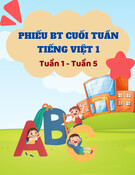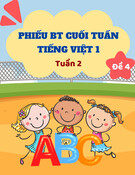
UNIT 1. FRIENDSHIP
Choose the answer A, B, C or D to indicate the word whose underlined part differs from the
other three in pronunciation in each of the following questions.
1. A. changeable B. manage C. average D. singer
2. A. cheese B. children C. chemical D. teacher
3. A. mutual B. unselfish C. hurry D. trust
4. A. psychology B. cheese C. change D. church
5. A. sympathy B. beautify C. qualify D. deny
Choose the answer A, B, C or D to indicate the word that differs from the other three in the
position of primary stress in each of the following questions.
1. A. generous B. suspicious C. constancy D. sympathy
2. A. sorrow B. mutual C. pursuit D. influence
3. A. acquaintance B. unselfish C. attraction D. humorous
4. A. intelligent B. interesting C. hospitable D. favourite
5. A. loyal B. secret C. sorrow D. sincere
Choose the answer A, B, C or D to indicate the correct answer to each of the following questions.
1. My friend often shows her………………..whenever I have troubles
A. sympathy B. sympathize C. sympathetic D. sympathetically
2. He does not know much about the project but he is very…………………..
A. enthusiastic B. enthusiast C. enthusiasm D. enthusiastically
3. Daisy is so……………. .She only cares about herself, not about other people
A. helpful B. selfish C. loyal D. talkative
4. She is not determined and often changes her ideas. What a/an……………..girl she is!
A. uncertain B. mutual C. suspicious D. changeable
5. She felt an……………..to him when they first met each other.
A. attraction B. enthusiasm C. interest D. aim
6. A …………is a conversation about other people’s private lives which might be unkind or not true
A. quality B. sorrow C. secret D. gossip
7. He is not good …………… maths. He is incapable…………….calculating.
A. at /of B. on/for C. for/of D. with/in
8. Two friends should be loyal………………each other
A. on B. with C. over D. to
9. My father took…………….an interest in collecting stamps. He had a valuable stamp collection
A. on B. up C. in D. over
10. I don’t want to listen to you. I am tired………………your criticisms.
A. of B. in C. for D. with
11. You'd better …………….. home now before the rain starts
A. going B. go C. went D. to go
12. She saw somebody…………….through the window.
A. jump B. jumps C. to jump D. jumped
13. It was so kind of you……………me………………the problem.
A. help/ solve B. to help/ solving C. to help/ solve D. help/ to solve
14. Her mother will never let you…………….her daughter.
A. married B. marry C. to marry D. marrying
15. They have just decided……………their hiking trip tomorrow.
A. to put off B. putting off C. put off D. to putting off
16. We all agree……………..you whenever you are in need.
A. help B. helping C. to help D. helped

17. He said he would rather…………home than go to that terrible party.
A. staying B. stayed C. stay D. to stay
18. Please let me __________ your decision as soon as possible
A. know B. to know C. knows D. knowing
19. What would you like……………when you have some free time?
A. do B. doing C. to do D. done
20. We watched the little girl __________ across the street.
A. to walk B. walk C. is walking D. walked
Choose the answer A, B, C or D to indicate the most suitable response to complete each of the
following exchanges.
1: – “You have got beautiful eyes!” – “________________.”
A. I do B. Thank you C. You, too D. I know that.
2: – “Thanks for the lovely party.” – “_____________.”
A. Yes, it's really great B. No, it's not good
C. Oh, that's right D. I'm glad you enjoyed it
Read the following passage and choose the answer A, B, C or D to indicate the correct word or
phrase that best fits each of the numbered blanks
I'm sorry for not writing to you for two months. In my postcard sent to you when I was on vacation
in July, I told you about a new (1) __________ of mine, Lisa Moran, who lives near my uncle's farm in
Napan Valley, California. You may be curious (2)_________ what she is like.
Well, Lisa is of our age - 17 - and not very tall or slim. In fact, she has slightly rounded shoulders
and a plump face. The best features on Lisa's face are her green eyes and the two dimples on her checks.
She looks lively with her hair cut short and dressed in (2) ______ clothes - jeans and a T-shirt. (4)_______
I first met her at my cousin's birthday party, I was attracted by her easy-going and pleasingly direct
manners. Curiously enough, Lisa has the same (5) ______ in music as you and I.
That's enough about Lisa for the moment. How have you been doing with your school work? Please
write soon.
1: A. friend B. friends C. friendly D. friendship
2: A. to know B. know C. knew D. knowing
3: A. casual B. formal C. sports D. trendy
4: A. When B. Before C. After D. While
5: A. hearing B. taste C. sense D. way
Read the following passage and choose the answer A, B, C or D to indicate the correct answer to
each of the questions
When I was in high school, there was a girl whom I disliked. I don’t know why I dislike her.
She had always been friendly towards me, and had never done anything to cause me to feel the same way
I did about her. I was continually saying unpleasant things to her, making fun of her, snubbing her.
One day as I was going home from school, the girl caught up with me and told me that our
teacher wanted me to come back for a while. I did not believe her and walked on down the street, leaving
the girl standing alone.
The next day when I got to school, our teacher asked me: “Why didn’t you come back to the
school as I asked you to?” I said: “I didn’t know you wanted me?”. The teacher sent for the girl and asked
her: “Did you tell Rose to come back?” The girl answered, “I’m sorry, but I didn’t tell her; I couldn’t
catch up with her”. I was surprised and suddenly realized how pretty she was. I felt I ought to be ashamed
of myself and I found out all my faults in comparison with her liberality.
1. Why did the writer dislike the girl?
A. Because the girl dislikes her. B. Because the girl was not friendly to her.

C. The writer didn’t know why D. Because the writer didn’t feel comfortable with her.
2. We can infer from the passage that……………………
A. The writer always did the best to help the girl.
B. The writer didn’t behave well towards the girl.
C. The girl didn’t behave well towards the writer
D. The writer liked the girl very much.
3. The phrase “making fun of her” in the passage means “………........”
A. laughing at her B. looking at her
C. playing with her D. feeling funny when playing with her
4. How did the writer react when the girl told her that the teacher wanted to see her ?
A. She got very angry. B. She went to meet the teacher
C. She thought the girl was telling a lie D. She believed the girl
5. Why did the girl tell a lie to the teacher?
A. Because she was afraid of him.
B. To avoid being punished by the teacher.
C. Because she thought the teacher would get angry if she told him the truth.
D. To help the writer avoid the teacher’s punishment
Rewrite each of the sentences in such a way that each has the same meaning as the original one
1. The teacher allowed me to stay at home to finish the assignment.
→ The teacher let ...................................................................................................................................
2. Don’t forget to turn off the gas stove.
→ You should ........................................................................................................................................
3. The children are not allowed to smoke.
→ Don’t let the children .........................................................................................................................
4. You should put your money into the bank.
→ You had better ....................................................................................................................................
5. They talked in the next room.
→ I heard................................................................................................................................................
6. Mr. Pinchley doesn’t allow his teenage children to go out in the evenings.
→ Mr. Pinchley makes ............................................................................................................................
7. Harry couldn’t get his parents’ permission to buy a motorbike.
→ Harry’s parents didn’t let ...................................................................................................................
8. We can’t possibly work in this noise.
→ It’s .....................................................................................................................................................

UNIT 2. PERSONAL EXPERIENCES
Choose the answer A, B, C or D to indicate the word whose underlined part differs from the
other three in pronunciation in each of the following questions.
1. A. change B. children C. machine D. church
2. A. guitarist B. passenger C. generous D. village
3. A. money B. notice C. glance D. ankle
4. A. change B. hungry C. stronger D. single
5. A. hand B. bank C. sand D. band
Choose the answer A, B, C or D to indicate the word that differs from the other three in the
position of primary stress in each of the following questions.
1. A. number B. eager C. special D. affair
2. A. feeling B. believe C. ready D. easy
3. A. acquaintance B. interest C. capable D. sympathy
4. A. cotton B. happen C. extreme D. quickly
5. A. experience B. embarrass C. floppy D. embrace
Choose the answer A, B, C or D to indicate the correct answer to each of the following questions.
1. I don’t like the look of that man. There is something ________about him.
A. glanced B. sneaky C. embarrassing D. noisy
2. He is too ________ to lend me his bicycle.
A. selfish B. enthusiastic C. helpful D. pleasant
3. The girl was so shy that she didn’t look at him in the face. She just ________ at him and looked
away.
A. glanced B. looked C. saw D. watched
4. : She made a big ________ about not having a window seat on the plane.
A. complaint B. fuss C. excitement D. interest
5. The experience helped me to grow _______.
A. in B. on C. at D. up
6. Teenagers nowadays often have their own ________ who they really love and imitate in different
ways.
A. clips B. idols C. fans D. lovers
7. It made me more interested ________learning English.
A. of B. about C. in D. on
8. A person or thing that is loved and admired very much is the________.
A. ideal B. idea C. idol D. fan
9. A short part of a film or movie that is shown separately is called a ________.
A. picture B. clip C. news D. cartoon
10. She was in a very ________situation. She felt so stupid and didn’t know what to say .
A. embarrass B. embarrassed C. embarrassing D. embarrassment
11. A burglar ________into the house while we ________television.
A. broke/ were watching B. broke/ watched C. had broken/ watched D. broke/ had watched
12. I________on the bus and sat down next to a schoolboy about my age.
A. got B. get C. have got D. getting
13. When I came, he ________. I was sad as I couldn't say "Good bye" to him.
A. was about to leave B. was leaving C. has already left D. had already left
14. Before he turned 14, Mozart ________ a few lesser piece for the piano.
A. has composed B. had composed C. was composed D. would composed
15. You________ your new hat when I ________you yesterday
A. were wearing/ had met B. wore/ had met C. wore/ was meeting D. were wearing/ met

16. They ________small cups of coffee after they________ dinner
A. had drunk/ finished B. drank/ finished
C. were drinking/ finished D. drank/ had finished
17. When he________ at the station, his train already________.
A. arrived/ left B. arrived/ had left C. had arrived/ left D. had arrived/ left
Mark the letter A, B, C, or D to indicate the underlined part that needs correction in each of the
following questions.
1. I was extreme(A) excited(B) and decided(C) to go(D) to the shop at once.
2. Good(A) friendship should be basing(B) on(C) mutual understanding(D).
3. While I did(A) my homework(B), I had(C) a(D) good idea.
Choose the answer A, B, C or D to indicate the most suitable response to complete each of the
following exchanges.
1. John: “What is your girlfriend like?” - Mary: “_________.”
A. Oh, really good. B. she is so nice and generous.
C. I like playing badminton. D. She is beautiful.
2. - Would you like a drink? → “___________”.
A. I don’t like coffee B. I prefer tea
C. Coffee, please D. I’m very thirsty
Read the following passage and choose the answer A, B, C or D to indicate the correct word or
phrase that best fits each of the numbered blanks
MARIA’S HOMECOMING
When the bus _____ (1)_____in a small square, Maria was reading her magazine and didn’t realize
that she had arrived at her destination. “This is Santa Teresa,” Martin said. “You’ve arrived home!” I
suppose your cousin will be _____ (2)_____for us. Come on. I’ll carry the bags.” Maria thought, “All
those years when I _____ (3)_____in New York, I used to dream if this moment. And now it’s real, I
can’t believe it! Here I am, I’m really standing in the square.” Santa Teresa was Maria’s birthplace, but
she often left the town at the age of six. She had some _____ (4)_____of the town, and some photos, but
did she belong here still? She didn’t know. Nobody was waiting in the square. Perhaps her cousin Pablo
hadn’t received Maria’s letter. “What are we going to do now?” asked Martin. “There isn’t _____
(5)_____a hotel here!”
1. A. reached B. got C. stopped D. came
2. A. expecting B. waiting C. welcoming D. receiving
3. A. was living B. have lived C. live D. am living
4. A. recall B. memories C. thinking D. remembering
5. A. even B. hardly C. too D. very
Read the following passage and choose the answer A, B, C or D to indicate the correct answer to
each of the questions
MANDI’S MAKING FRIENDS
My name’s Mandi. Three months ago, I went to disco where I met a boy called Tom. I guessed he was
older than me, but I liked him and thought it didn’t matter. We danced a couple of times, then we chatted.
He said he was 18, then asked how old I was. I told him I was 16. I thought that if I told him my real age,
he wouldn’t want to know me, as I’m only 13.
After the dicso we arranged to meet the following weekend. The next Saturday we went for a burger
and had a real laugh. Afterwards he walked me to my street and kissed me goodnight. Things went really
well. We see each other a couple of times a week, but I’ve had to lie to my parents about where I’m going




![Bài tập so sánh hơn và so sánh nhất của tính từ [kèm đáp án/mới nhất]](https://cdn.tailieu.vn/images/document/thumbnail/2025/20250808/nhatlinhluong27@gmail.com/135x160/77671754900604.jpg)
![Tài liệu tham khảo Tiếng Anh lớp 8 [mới nhất/hay nhất/chuẩn nhất]](https://cdn.tailieu.vn/images/document/thumbnail/2025/20250806/anhvan.knndl.htc@gmail.com/135x160/54311754535084.jpg)




![Tài liệu Lý thuyết và Bài tập Tiếng Anh lớp 6 [Mới nhất]](https://cdn.tailieu.vn/images/document/thumbnail/2025/20250802/hoihoangdang@gmail.com/135x160/18041754292798.jpg)





